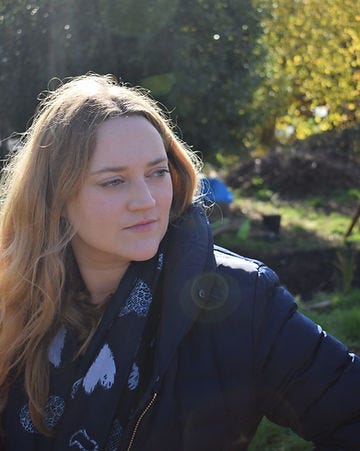In Conversation with... Cara Bamford
Cara Bamford is a film director, writer, actor and producer. Her short film Talia - a family drama with a green heart, made in Bristol, UK - recently won the 2020 York Youth Award at Aesthetica Short Film Festival. In this conversation with Miss En Scene, Cara explains how Bristol inspired her while writing and researching her film, the practicalities of sustainable film production and the rewarding process of filmmaking.
Clare - Miss En Scene: First of all, can you tell us about what you do as a filmmaker and what this involves?
Cara: I act, write, direct and produce in film – depending on the project. I discovered a love of film and TV as a young actor. I was a recurring tearaway student on Channel 4’s Teachers and popped up in small roles on Casualty (BBC 1), The Sugar Dynasty (BBC 2), and feature film Lost Dogs (dir. Jim Doyle). It was while I studied for my masters, at RADA in London, that I was able to develop skills off-stage and behind-the-camera; writing, directing and producing projects, while learning to trust my voice in the process. It was tough, and terrifying. But there’s something about showcasing your work every week to an audience and hearing their honest feedback that helps you to leave your ego and insecurities at the door.
More recently, I’ve co-produced for award-winning, female-directed short films, including Testimony (dir. Kamila Dydyna) and Help (dir. Sue Dunderdale), and worked in production for children’s television, including The Amazing World of Gumball (Cartoon Network) and Doc McStuffins (Disney). Working for studios meant starting at entry-level and moving your way up through the ranks, with long shifts and an often intense schedule; I have never been short of guidance and inspiration from the teams I’ve met during my time in production. It’s full-on, but brilliant.
Making a move into directing is something I’ve wanted to do for a long time, but I would often find myself worrying about where to start – having worked with independent female filmmakers definitely made the difference; it’s women in the industry who have helped me to be less afraid of failing. Ultimately, you start where you are, get your ideas written down, and reach out from there.
As a director and writer of my own projects, it has also meant producing, too – certainly when a project is in development – it’s about being economical with what you have in order to tell the stories you want to tell.
Clare: What do you find are the advantages of both writing and directing on the same project?
Cara: Writing and directing on the same project is both a wonderful luxury, and a challenge. I might find myself quite close to the text, enjoying being able to delve into the nuances of character with the actors. But, it also means allowing the actors the space to explore the text for themselves, and not becoming too protective over certain areas of the writing. The real reward is seeing the story evolve in the whole process.
Having had experience in both acting and producing, I hope that gives me more balance in my approach to directing: allowing the story to evolve beyond the written text, yet within the requirements of production. Of course, being too ‘producer’ when it’s not my role, was something I’ve had to get used to, as well. I’m still working on that.
Ultimately, it’s about trusting your crew, and trusting the process. Both writing and directing means I am able to truly tell a story from start to finish. It’s wonderfully creative.
Clare: What's the film scene like in Bristol - and the south west of the UK generally?
Cara: I’m so proud to be part of this creative city and amazing region. The film scene has its advantages and disadvantages, being so close to London, but Bristol is packed with talented filmmakers and artists, who never cease to amaze and inspire me.
Clare: As a female filmmaker, what has your experience been like in the industry so far?
Cara: As a female filmmaker, I don’t think it’s unusual that I found my way into production. Being a producer felt more accessible than a director or writer, but having worked with so many talented women, I haven’t been short of inspiration and guidance, and one of the things all these women have in common is that they made opportunities for themselves.
Clare: For anyone - particularly women and girls - wanting to get into film, what advice would you give them?
Cara: Women and girls should know that their voice is needed, and they are worthy. It’s so often true that girls are raised to be careful and boys are raised to be courageous – so my advice is: be braver. If you have a story to tell, get it written down. Don’t strive for perfection all the time. If you want to work in film, starting with an entry-level position or volunteering on community projects could be worthwhile. Never let age limit you.
Clare: Congratulations on your latest short film, Talia, which is currently on the festival circuit and doing brilliantly! Can you tell us about your journey with Talia, up to this point?
Cara: Thank you! I am so proud of the whole team, it really has been a joy to see the film be received so well at festivals. Winning the York Youth Award at Aesthetica was an incredible honour that we’re all still smiling about. I’d been wanting to write Talia for years, it was a story I’d had in my mind, and was inspired by areas around Bristol. It was a feature script I’d been developing before it became a short.
I wrote the short version during the winter when I had a broken ankle and was stuck indoors a lot. The writing definitely helped me mentally, and as soon as I was up and about, I started to explore the places in Bristol that had originally inspired me: Montpelier, St. Werburgh’s, Greenbank and St. George. It was noticing spring and all things green on the horizon that kept me feeling positive and found their way into the script.
I wanted the film to be diverse, inclusive and sustainable, which is so important in filmmaking and took time to research, source talent and ensure we had at least 50% female crew. It was a lesson, every step of the way. We began filming in October 2018, and it took two years to get the film wrapped, through post and out onto the festival circuit. It was a work of patience, but worth it.
Clare: Talia is a film about a young girl who loves nature. Without any spoilers, what else can you tell us about it and what are you hoping that people take away from it?
Cara: Talia is a brave eight-year-old kid who has an affinity with nature. She’s clever, she knows what she’s doing, so there’s no pulling the wool over her dad’s eyes when she gets caught out for trying to sneak off and play in the nearby allotments without permission. Alongside the theme of nature in urban areas, the film explores grief and loss, as well as finding friendship when you least expect it. I hope it brings the subject of childhood bereavement into focus, as well as the importance of getting outside in nature as part of our healing process.

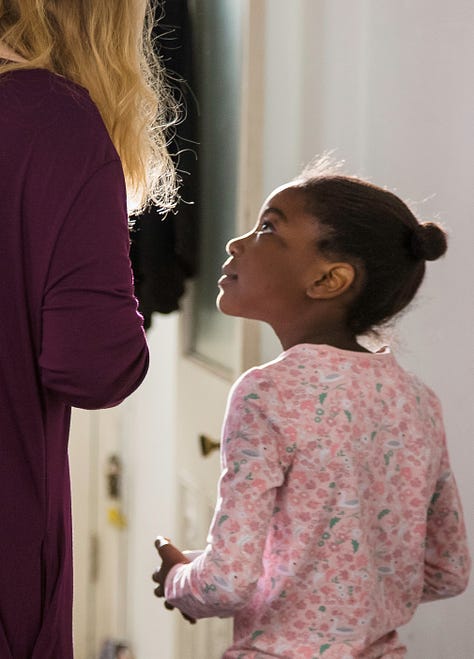
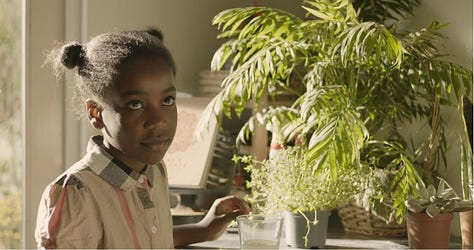
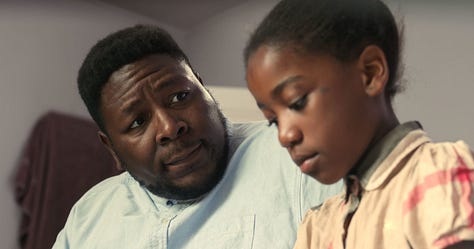

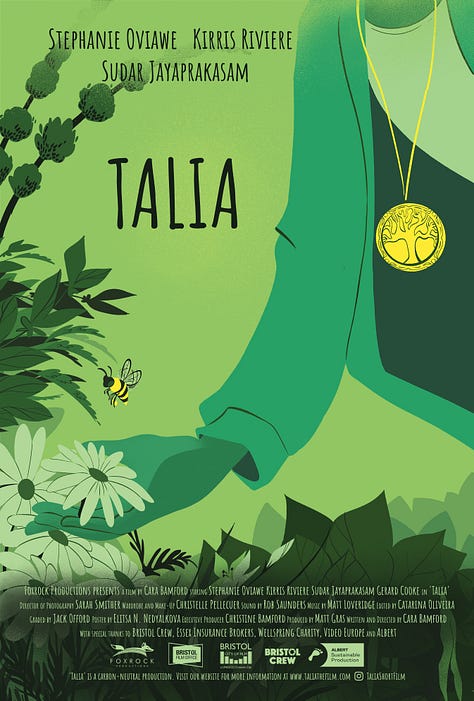
Clare: I read that Talia is an Albert certified production. What does that mean, and why was it important to you to ensure that your film was sustainably produced?
Cara: As much as I love green spaces, when living in a city you might also see litter or pollution existing beside it. This stood out to me while I was researching the script, and I felt that Talia would be the kind of child who would take care of her environment. The idea stuck, and themes of sustainability were written in to the script, from the very start. When it came to production, I teamed up with producer, Matt Gras, who has Carbon Literacy training and we followed the Albert sustainability production guidelines as closely as we could.
Bearing in mind that we aren’t a studio production, there was a lot of guesswork in how to adapt to short-form, local, independent filmmaking, especially if there was low to no budget for certain parts of development. Since then, we have launched our own green film production company, Greenfox, which is part of Foxrock Productions, and specialises in helping local or community media projects create content sustainably.
Clare: My feeling is that filmmaking can be quite a carbon-intensive activity - especially for mass productions and blockbusters with multiple locations. Do you think the climate emergency is something that many filmmakers are aware of and consider in their work? If not, is there anything you learnt from making Talia that other directors and producers could take on board?
Cara: I’d agree with you! Filmmaking can leave a huge carbon footprint, and it often leans towards relying on single-use, disposable items, or long-haul travel. For Talia, we focused on local talent, local companies and local providers, where possible. Many people walked or cycled to location, if they could, and we were almost entirely paper-free.
We provided concise sustainability training to cast and crew, so they knew what to expect during production. We learned so much from the process, and it does take extra preparation – plus, at some point, everyone will misplace their own mug, even if they’re labelled! It’s about adapting to new rules, and if you do need to lean on single-use items, recycle them responsibly and keep it to a minimum.
Clare: Finally, after this festival circuit has come to an end, what's next for you?
Cara: Back to the feature script! The short was both a story in its own right and a proof-of-concept. So, there’s that journey ahead. I’m also working on a couple of short scripts, so look forward to developing those in the near future.
You can follow Cara on Instagram and Twitter @carabamford or check out her production company here: www.foxrockproductions.com.
The official website for Talia is taliathefilm.com, and you can also follow @taliathefilm on Twitter / @taliashortfilm on Instagram.
Originally published on missenscene.co.uk in October 2020.



